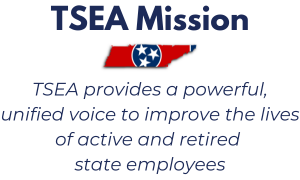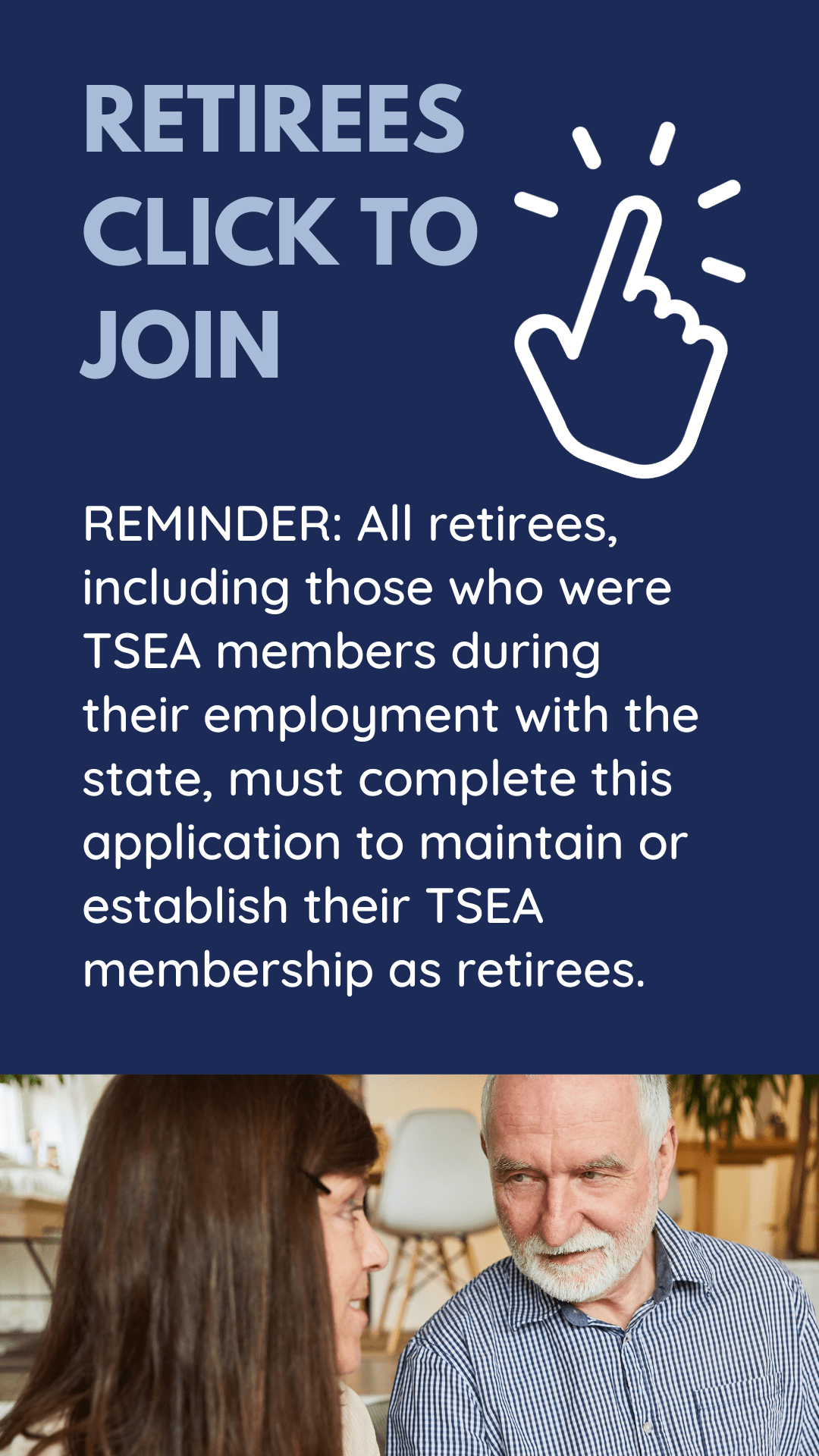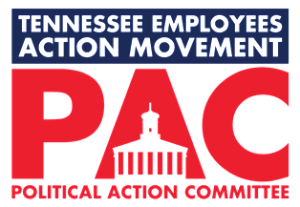
Governor Bill Haslam, Department of Human Resources Commissioner Rebecca Hunter, TSEA Executive Director Robert O’Connell, and members of the Tennessee General Assembly at the April 2012 signing of the TEAM Act
TSEA’s agreement to cooperate with the Governor’s Administration on the TEAM Act (Tennessee Excellence in Accountability Management Act) was a result of weeks of negotiations and help from our friends in the House and Senate.
The bill is not perfect, but TSEA was able to secure enough improving amendments to the original bill that we were able to support the TEAM Act. We look forward to being involved in its implementation and ensuring that your valuable services as state employees continue to be respected and protected.
The essence of Civil Service Protections has always been the right not to be fired, except for cause, and not at will, and the right to grieve and appeal terminations, suspensions, and demotions. These foundational protections are ALL still intact.
Below, you will find the items which resulted from our negotiation process as well as links and resources to help you better understand your rights and protections as a Preferred Service employee:
Hiring Process
• Restored veteran’s preference in hiring.
• Added veterans’ spouses to list guaranteed an interview.
• Promotion list, as defined in code, is reestablished. Criteria for establishment of promotion list will be in Department of Human Resources rules.
• DOHR must generate a monthly report for the Legislature of all hires, reclassifications, and layoffs, among other personnel changes.
Department of Human Resources Rules: Hiring (1120-02, 1120-03, and 1120-07)
Pay and Performance Evaluation System
• All employees will be eligible to be considered for merit pay, with specific criteria established in the Department of Human Resources rule making process.
• Any salary classification upgrade will result in a pay adjustment for existing employees who fall below the minimum range and not just for new hires.
• Although not a part of the TEAM Act itself, the following budget provision resulted from negotiations regarding the TEAM Act: 2.5% Across-the-Board raise proposed in the Governor’s budget for July 2012 would be a truly across-the-board – no one will be denied the raise based on performance or discipline. The Administration has agreed to add this language to the Governor’s budget amendment.
• Report on new Performance Evaluation system must be made to the State & Local committees of the House and Senate.
• All rules regarding the performance evaluation system and any other provision of the TEAM Act will go back to the Government Operations Committee’s of both the House and Senate for approval.
• Agreement that state employees and state employee groups will have a formal input process regarding the implementation of the TEAM Act and the new Performance Evaluation system and any adverse effects.
Department of Human Resources Rules: Pay (1120-04)
Department of Human Resources Rules: Performance Evaluation System (1120-05)
Key Dates for the 2012-2013 Performance Evaluation Cycle
Reductions in Force
• Language was changed to ensure that seniority must also be considered even though performance would be the primary factor of consideration in a layoff.
• Retained career counseling and job placement during RIF process.
• Extended the minimum notice period of RIF’s when the Rainy Day Fund falls below $200 million from 10 days to 14 days.
A guide to changes to the current civil service system:
• Any positions re-established after a RIF will retain preferred service protections and not be reclassified as executive service.
• Restoration of a Recall List, where all laid off employees will be notified if a new position with their classification opens in ANY department anywhere in the state within 1 year, and will be guaranteed an interview for that position.
• RIF Notices will continue to be 90 days until October 1, 2012. The notice period will then go to 60 days until December 31st, 2013 and from January 1, 2014 onward, it will be a 30 day RIF notice.
Department of Human Resources Rules: Reductions in Force
Appeals and Mediation Process
• The appeals process will have concrete deadlines for both the employee and the state at each step.
• The final step must be completed within 120 days.
• A “Face-to-Face” meeting is now established in Step 1 of the 3-Step appeals process
- A face-to-face meeting with the Commissioner of your department or his/her designee;
- A review by the Commissioner of Human Resources;
- A hearing before the Board of Appeals (formerly Civil Service Commission)
• Grievant is able to appeal suspensions of 3 days or more to all 3 levels of the grievance process.
• Any suspension less than 3 days is appealable to level 2.
• The burden of proof has been placed back on the state/agency and not on the employee.
• A mediation process will be added to the grievance system and be clearly defined in the Department of Human Resources rules. This mediation process will also be available for issues that are presently non-grievable.
• Requirement for progressive discipline will be established in Department of Human Resources rules.The final Rules will be posted regarding the Appeals Process once they are finalized and filed with the Secretary of the State.
• The reappointment of some Civil Service Commission members to the new Board of Appeals.
• The new Board has 9 members, like the present Civil Service Commission, rather than 7 as proposed in the original TEAM Act.
• Governor’s right to remove Board of Appeals members must be “for cause” and not “at will.”
• Board of Appeals sunset date of 2014, at which time the Board will be re-evaluated for abuses and issues.
Department of Human Resources Rules: Appeals and Mediation (1120-10 and 1120-11)
TEAM Act FAQ’s: TSEA
TEAM Act FAQ’s: Department of Human Resources










